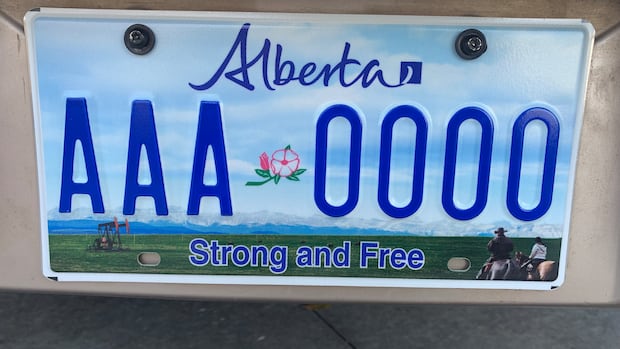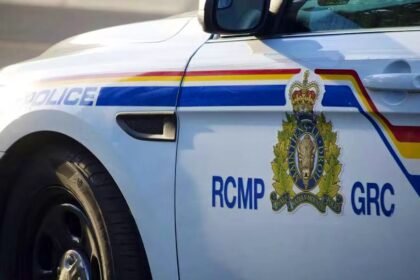New Brunswick Part of the Canadian national anthem is turning out to be a possible legal headache for the Alberta government. Saint John woman owns rights to Alberta’s ‘Strong and Free’ motto — if it appears on licence plates Sam Farley · CBC News · Posted: Oct 28, 2025 5:00 AM EDT | Last Updated: 2 hours agoListen to this articleEstimated 5 minutesAlberta recently announced plans for a new licence plate. This is one of six designs that residents can vote on, but all bear the provincial motto ‘Strong and Free.’ (Nathan Gross/CBC)Part of O Canada could become a legal headache for the Alberta government as a New Brunswick business looks to defend its trademark.Earlier this month, Alberta Premier Danielle Smith unveiled six potential licence plate designs for residents to vote on as the province switches to a new plate. While the choices featured different designs, from cowboys to oil rigs, all had the province’s official slogan “Strong and Free.” The problem is, a local business in New Brunswick already holds the trademark for “Strong & Free.”The trademark, which was approved by the government in 2022, specifically names more than 200 items Dow’s design might be made on, but can’t without her permission. It lists everything from clothing, hats, lanterns, towels, hockey pucks, belts buckles and metal licence plates. The logo protected by the trademark features three red maple leaves over a banner that says “Strong & Free.” WATCH | ‘I’ve invested my life savings to build this brand,’ business owner says:A new slogan proposed for Alberta licence plates is already taken by N.B. companyA business in Saint John that holds the trademark for “Strong and Free” hopes to work out a solution with the Alberta government, which may use the phrase, the English translation of its motto, on its new licence plates. Denise Dow, the Saint John founder of Strong & Free Emblem, Inc., spoke patriotically about how she founded her business. “I tell people that ‘Strong and Free’ picked me because it was just something that came to mind as the one phrase in our anthem that speaks strongly to our identity and our support for human rights and freedoms for all humanity.”Dow said she runs it as a licensing royalty model, working with manufacturers across Canada who can purchase use of her “Strong & Free” emblem for products they are then allowed to make and sell themselves. In provinces like New Brunswick that only require rear licence plates on cars, many people will use a decorative, novelty one on the front, she said. Saint John, N.B. business owner, Denise Dow, holds a trademark on the slogan “Strong and Free” for licence plates. (Sam Farley/Zoom)Not long after Alberta announced its new plates, Dow said, she started getting messages from customers, so she said she consulted her trademark lawyer. “We obviously don’t want to stop anybody from, you know, promoting Canadian pride because that’s what I enjoy doing,” Dow said. “And we want people to celebrate Canada.”The ideal scenario, she said, would be to “negotiate an agreement” with Alberta for the province to use the trademark with a “nominal royalty,” some of which Dow said she would donate to a charity in Alberta.Alberta Premier Danielle Smith recently unveiled the design options for a new licence plate. (Amber Bracken/The Canadian Press)CBC News reached out to both Premier Smith’s press secretary and Service Alberta, the department that oversees motor vehicle registrations, but did not receive any response from either. In a news conference launching the plates on Oct. 15, Smith said the slogan is a translation of Alberta’s Latin motto, Fortis et Liber.“The motto’s inclusion on the licence plate will also serve as a nod to Canada’s national anthem, and Alberta’s position as a strong and sovereign province within a united Canada,” Smith said. Norman Siebrasse, a University of New Brunswick professor who specializes in patent law, said this dispute could be a tricky case.Albertans to decide province’s new licence plate design in tournament-style voteHe said companies will register a trademark for specific goods. The more unlike two specific goods are, the less likely they will be confused with each other, which he highlighted as a key aspect of Canadian trademark law. In this case, a court would have to look at whether there’s confusion between the souvenir licence plates made by the New Brunswick company and the real, government-issued plates Alberta is proposing. Norman Siebrasse, a University of New Brunswick law professor. says it could be a tricky case. (Submitted by Norman Siebrasse)Siebrasse said a trademark has to be distinctive and clearly identify a brand.“So that would be another ground of attack that the Alberta government would say,” Siebrasse said, adding that the fact the company’s trademarked slogan is also in the national anthem and Alberta’s motto “goes to the lack of distinctiveness.” “So you have to have actually developed a reputation,” he said. “It’s not enough to just use the mark and have sold a few. You got to have developed to the point where everybody looks at a plate that says strong and free and say, ‘Oh yeah, that’s made by you.’”“The fact that it’s a very, very common slogan is going to give the Alberta government a chance to … argue that it’s not distinctive.”Siebrasse said most court cases over trademarks will settle due to how expensive it is to go to court, but added that it’s common for cases to begin but later be settled. Dow said it’s not unheard of for her to have to defend her trademark, noting that her business has been operating since 2007.“You have to be ready for, you know, some infringements,” she said. “But I would say, you know, most of the time it’s because somebody has not realized that it was trademarked and what constitutes the trademark agreement.”Dow said she manages her business alone and can’t afford “legal battles,” but she is usually able to come to an agreement with anyone that has infringed on her trademark. “I’ve invested my life savings to build this brand, to pay for the trademarks, to defend the trademarks,” Dow said.“And I’ve done this so that I can pass on a legacy of a financial legacy to my family with my son being autistic and my daughter potentially having to kind of help him out.”ABOUT THE AUTHORSam Farley is a Fredericton-based reporter at CBC New Brunswick. Originally from Boston, he is a journalism graduate of the University of King’s College in Halifax. He can be reached at sam.farley@cbc.ca
N.B. business in trademark tangle with Alberta government over licence plates











